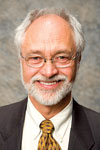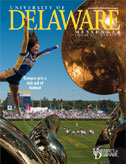Empowering people in Appalachia

ALUMNI | The most impoverished and environmentally degraded communities in America are found in the Appalachian coal country and the isolated mining communities of the Mountain West. For many, these problems are invisible. For Allan Comp, they are all-consuming.
A program analyst with the federal Office of Surface Mining (OSM) at the Department of the Interior, Comp is improving these degraded environments by empowering their people.
Working with few resources, he conceived and created the Appalachian Coal Country Watershed Team, a partnership between OSM and VISTA (Volunteers in Service to America) volunteers who work in coal country with local citizens. Recently, at the request of Colorado officials, Comp launched a similar effort in Western mining communities.
“I thought no one ever cared about us and no one wanted to do anything to clean up the water and address the poverty,” said West Virginia native April Trent, who works with Comp.
“When I saw what Allan does, I was so excited. He’s passionate about getting people the help they need, and he’s providing the voice for people who live near abandoned mine sites.”
These OSM/VISTA volunteers, mostly recent college graduates, work for one year helping local citizens and civic groups apply for federal grant money, organize community volunteers to conduct various cleanup initiatives, monitor water quality and conduct community education and outreach programs.
Since the program was launched in 2001, Comp’s teams have helped local residents secure $11 million in funding or in-kind contributions, and some 100 volunteers have logged nearly 116,000 hours of work. They are building sewer systems, engaging high school students in community projects, leading reforestation efforts, enhancing civic engagement and returning their rivers and streams to a much-improved condition.
Danny Lytton, an OSM administrator, estimates that for every dollar spent on the teams, it returns $100 for environmental cleanup.
Comp said that what makes him most proud, though, is that his initiative has become a “net importer of talent to the Appalachian coal country,” and he expects the same results in the newer Western team.
“More people who have worked with us have stayed in the region than have left. And that’s cool,” said Comp. “In a place where there’s a mass exodus of talent, they’re finding ways to stay and keep making a difference.”
Dewey Houck, a West Virginian who started a local watershed association as a result of Comp’s efforts, added, “One thing people don’t really focus on is the young people that go through his program. These young people are gaining a better understanding of what it takes, not just to improve the environment, but to be a community leader.”
Comp is now working to apply his successful model to other impoverished regions of the country. Two years ago, officials in Colorado's state mining office called Comp's boss and asked if they could have a team like the one working in Appalachia. Thus, the Western Hardrock Mining Team, described as a "coalition of change-minded community improvement groups," was born. Similar programs are under way in New Mexico and Montana.
Asked to assess the impact of his work, not surprisingly, this man who is charged with cleaning the environment focused on people. “My great joy is that I can help others make a difference,” Comp said. “It’s really nice.”
The Partnership for Public Service recently recognized 30 federal employees with its 2009 Service to America Medals and worked with washingtonpost.com to profile each honoree. This article is adapted from the published profile of Allan Comp, AS ’71M, ’78PhD.





